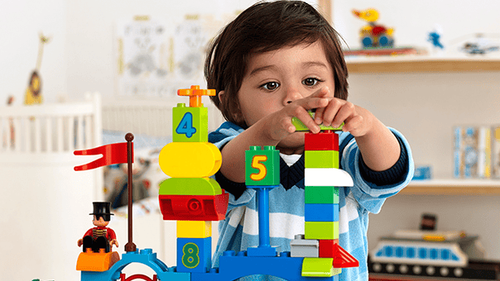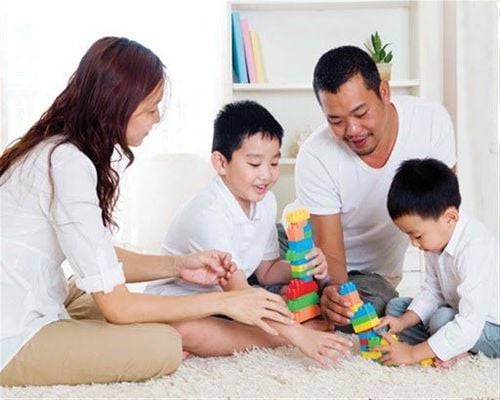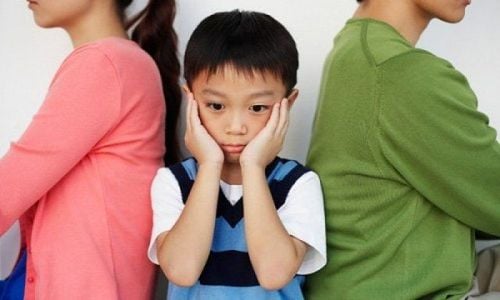This is an automatically translated article.
Posted by Master Nguyen Thi Yen - Pediatric Speech Therapist - Vinmec Time City International HospitalPlay is one of the most important ways children learn about the world around them. Play helps children learn many new skills, greatly promoting cognitive, thinking, social-emotional and language development. More importantly, while playing, children will have the opportunity to socialize with adults as well as peers. At this time, children learn how to get along with people, learn how to solve problems and how to communicate and use language effectively. Therefore, play and language development are extremely closely related.
1. Play grows as children grow
In the early years, babies often put things in their mouths or just throw toys away. This is how children experience and learn the difference in the feel and taste of different objects. After that, children begin to learn how to build blocks, play with cars, trains. Children learn to name objects and understand that objects can go together, they can play with toys in many different ways. During play, children can learn nouns (names of objects), verbs (words to manipulate or act on objects) and how to describe them. Children learn to explore objects and feel them: Where are these toys, big or small,...>>> How to develop language while playing with your child?
As children grow up, they begin to learn how to use one object in place of another. For example: a wooden block becomes a car or a phone, the puzzle pieces become construction sand, etc. Children play while naming the objects they think of. This is a wonderful connection between things and children's words. To develop meaningful language and communication, children need to have good imagination, interpretation and thinking skills. Children need to be able to respond to symbols appropriately. If children do not have a solid foundation in understanding and expressive language, they will not be able to talk about their game and represent the idea of play in an understandable way to others. Thus, it can be said that play and language go hand in hand in the growth of a child. Play skills must develop to a certain level before there are corresponding language skills.
2. Children can play with anything they have
For children, toys don't have to be expensive things. A blanket to play with peek-a-boo or some dried leaves can also make for a fun toy. You will be surprised that with just a bottle, a few peas, a spoon, a cup that children can play all day. From exploratory play such as: Put a bean in a bottle and shake it to make a sound, to imaginative play like: Pour a pea into a cup and pretend to eat it. Children often tend to prefer real objects related to daily activities such as cups, TV remotes, etc., rather than toys. Even for children, parents are their best toys.3. The power of play for language development

Chơi đồ chơi đóng vai trò quan trọng trong việc giúp trẻ phát triển ngôn ngữ
Through play, children learn to name objects, learn to count, learn to describe objects,... Children learn to play with language such as: Making different sounds and words while playing with people other. Play enriches children's vocabulary. Play helps develop listening skills and following requests/instructions. Play helps develop social and turn-taking skills. Language develops and also becomes more complex while children play. For babies: Play means exploring objects such as: Knock, bang, put in mouth, lick,... For young children: Play is building small blocks together, pushing umbrellas Filling, blowing bubbles,... For children in kindergarten: Play means pretending to feed dolls, pretending to talk on the phone, pretending to be a certain character such as: Doctor, firefighter,... >>> Language and cognitive development of 22-month-old babies
4. Some tips to play effectively with your child
Sitting opposite: Children need to see you to share all eyes, gestures, emotions when playing. Get involved rather than just being in your child's play: Understand your child's level of play and strive to create appropriate play activities, participate and share activities with your child (e.g. Play with your child on floor with toys). Talk about what you and your child are doing during play. Children will understand and know how to name the activity they are doing. Organize play activities where children have the opportunity to be active and use words (for example: Play with cars: “go”, “car go”,...). When you actively participate in play with your child, you are sharing quality time with your child. You will provide your child with an extremely rich source of vocabulary, and at the same time model for him how to use appropriate communication language. >>> Language and cognitive development of 17-month-old babies
Việc chơi cùng trẻ sẽ giúp trẻ ghi nhớ một số mẫu câu đơn giản thường sử dụng
5. Build a habit of having fun every day
Make a game out of everyday objects, for example, a towel or a cup,... Example: You use a small towel to play peek-a-boo, you can also place the towel on a part a certain body (eg mouth, nose,...) and ask the child to name the body part that has been covered. >>> Language and cognitive development of 14-month-old babiesCreate games in familiar everyday spaces such as: Kitchen, bathroom, living room, bedroom,... For example, you can hide some objects (vegetables, fruits) and instruct the child to name the objects and their location. For example: Apples are on the table, lemons are in the box,... Create games in daily activities such as: Snack time, bath time,... For example, during mealtimes, you can teach your child name foods, fruits,...; During bath time, you can add a few more animals to bathe with your child (for example: Duck, fish, ...) and teach your child to name actions such as: Duck swimming, fish jumping,...
6. Plan a 1-week play activity
Think of a few questions before you begin planning a week of play with your child:>>> Are you ready to raise your kids?
What games can your child play? What will your child learn by playing this game? Once you understand your child's level of play, you can start planning play activities with your child. Choose activities that your child enjoys and that you can participate in. Where will you play this game? Can the games you've come up with can be done in the bedroom, bathroom, or out on the playground? How would you play this game? Make sure you understand and know how to play the game before teaching your child to play with it. Sometimes, in some games, children will appear confused or confused during the first few turns. Try to patiently explain to your child in a very clear and understandable way. What can you say during play to encourage language development? Think about the vocabulary and sentence patterns that you want to model for your child in the activity. Use words related to the activity you and your child are doing to comment. How will you support your child during play? Think about how you can encourage your child to play and use new words. You can repeat words or sentences many times while playing (eg “car goes”), waiting and playing alternately with children... >>> Are you fit to be a parent?
Along with playing with children, to protect their health in the most comprehensive way, parents should do well to exclusively breastfeed their babies for the first 6 months (if possible) and vaccinate on schedule. As soon as the child shows symptoms such as anorexia, fatigue, crying, it is necessary to take the child to the hospital to be consulted by a specialist for monitoring and treatment. Currently, the Pediatrics Department at Vinmec International General Hospital is trusted by many parents to examine the diseases that infants and young children are susceptible to. Vinmec brings satisfaction to customers and is highly appreciated by industry experts by:
Gathering a team of leading pediatricians: including leading experts with high professional qualifications ( professor, associate professor, doctorate, master), experienced, worked at major hospitals such as Bach Mai, 108.. The doctors are well-trained, professional, have a heart - a vision. Understanding young psychology. Besides domestic pediatricians, the Department of Pediatrics also has the participation of foreign experts (Japan, Singapore, Australia, USA) who are always pioneers in applying the latest and most effective treatment regimens. . Comprehensive services: In the field of Pediatrics, Vinmec provides a series of continuous medical examination and treatment services from Newborn to Pediatric and Vaccine,... according to international standards to help parents take care of their baby's health from birth to childhood. Advanced techniques: Vinmec has successfully deployed many specialized techniques to make the treatment of difficult diseases in Pediatrics more effective: neurosurgery - skull surgery, stem cell transplantation blood in cancer treatment. Professional care: In addition to understanding children's psychology, Vinmec also pays special attention to the children's play space, helping them to play comfortably and get used to the hospital's environment, cooperate in treatment, improve the efficiency of medical treatment.
Please dial HOTLINE for more information or register for an appointment HERE. Download MyVinmec app to make appointments faster and to manage your bookings easily.
Reference source: tyketalk.com, theministryofparenting.com












